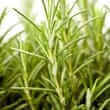Background
- Rosemary (Rosmarinus officinalis) is a common evergreen shrub grown in many parts of the world. The fresh and dried leaves are used as a food preservative and in traditional Mediterranean cuisine as a flavoring agent. Historically, rosemary has been used medicinally to treat renal colic and dysmenorrhea (painful menstruation). It has also been used to relieve symptoms caused by lung or breathing (respiratory) disorders and to stimulate the growth of hair. Today, extracts of rosemary are often used in aromatherapy to treat anxiety-related conditions and to increase alertness.
- Well-conducted human trials investigating rosemary are lacking. Rosemary appears to hold promise in the improvement of mental state when used in aromatherapy and as a treatment for alopecia. Rosemary leaf is approved by Germany's Commission E for the treatment of dyspepsia, and rosemary oil (used externally) is approved for joint pain and poor circulation.
References
- Burnett KM, Solterbeck LA, and Strapp CM. Scent and mood state following an anxiety-provoking task. Psychol. Rep 2004;95(2):707-722.
View Abstract - Dragan S, Nicola T, Ilina R, et al. Role of multi-component functional foods in the complex treatment of patients with advanced breast cancer. Rev.Med Chir Soc.Med Nat.Iasi 2007;111(4):877-884.
View Abstract - Fuchs SM, Schliemann-Willers S, Fischer TW, et al. Protective effects of different marigold (Calendula officinalis L.) and rosemary cream preparations against sodium-lauryl-sulfate-induced irritant contact dermatitis. Skin Pharmacol Physiol 2005;18(4):195-200.
View Abstract - Gobert M, Martin B, Ferlay A, et al. Plant polyphenols associated with vitamin E can reduce plasma lipoperoxidation in dairy cows given n-3 polyunsaturated fatty acids. J Dairy Sci 2009;92(12):6095-6104.
View Abstract - Greenlee H, Atkinson C, Stanczyk FZ, et al. A pilot and feasibility study on the effects of naturopathic botanical and dietary interventions on sex steroid hormone metabolism in premenopausal women. Cancer Epidemiol.Biomarkers Prev 2007;16(8):1601-1609.
View Abstract - Hay IC, Jamieson M, and Ormerod AD. Randomized trial of aromatherapy. Successful treatment for alopecia areata. Arch Dermatol 1998;134(11):1349-1352.
View Abstract - Kim MA, Sakong JK, Kim EJ, et al. [Effect of aromatherapy massage for the relief of constipation in the elderly]. Taehan Kanho.Hakhoe.Chi 2005;35(1):56-64.
View Abstract - Kim MJ, Nam ES, and Paik SI, [The effects of aromatherapy on pain, depression, and life satisfaction of arthritis patients]. Taehan Kanho.Hakhoe.Chi 2005;35(1):186-194.
View Abstract - Lukaczer D, Darland G, Tripp M, et al. A pilot trial evaluating Meta050, a proprietary combination of reduced iso-alpha acids, rosemary extract and oleanolic acid in patients with arthritis and fibromyalgia. Phytother.Res 2005;19(10):864-869.
View Abstract - Martinez AL, Gonzalez-Trujano ME, Pellicer F, et al. Antinociceptive effect and GC/MS analysis of Rosmarinus officinalis L. essential oil from its aerial parts. Planta Med 2009;75(5):508-511.
View Abstract - McCaffrey R, Thomas DJ, and Kinzelman AO. The effects of lavender and rosemary essential oils on test-taking anxiety among graduate nursing students. Holist.Nurs.Pract 2009;23(2):88-93.
View Abstract - Minich DM, Bland JS, Katke J, et al. Clinical safety and efficacy of NG440: a novel combination of rho iso-alpha acids from hops, rosemary, and oleanolic acid for inflammatory conditions. Can.J Physiol Pharmacol 2007;85(9):872-883.
View Abstract - Moss M, Cook J, Wesnes K, et al. Aromas of rosemary and lavender essential oils differentially affect cognition and mood in healthy adults. Int J Neurosci 2003;113(1):15-38.
View Abstract - Park MK and Lee ES. [The effect of aroma inhalation method on stress responses of nursing students.]. Taehan Kanho.Hakhoe.Chi 2004;34(2):344-351.
View Abstract







